- English
- Русский
In this article, you'll learn about the best Alliances, Builds, and Strategies in the current Underlords Meta. All in-depth guides about specific builds can be found in our Dota Underlords Builds collection.
If you're interested in information about each individual hero, you can get it in our Underlords Heroes Tier List.
There are two main criteria when we order the Alliances.
The best Alliances in the current meta are ordered below with info about each one. We share our thoughts about both the late game strength and reliability of each Alliance in Dota Underlords.
The Knockout mode meta is actually significantly different than the standard meta.
Because of these differences in macro strategy, some Alliances are more/less valuable in standard than in KO and vice versa. In a few words:
It feels as if most builds and strategies are totally viable, with (4) Heartless (3) Hunter (3) Warriors + Vigilant leading the way.
Bloodseeker carry and Spirit builds are also quite strong, but less problematic.
Since a few of the top builds are harder or even impossible to get in KO, currently the KO meta is quite a bit better balanced compared to the standard meta.
The list below takes mostly Standard performance into account, but if the Alliance performs much differently in KO we talk about it in the detailed info.
The icons are CLICKABLE and reveal the detailed info:
Heartless:
(2) Heartless is very easy to get and almost mandatory for all physical damage builds.
(4) Heartless is the most common damage-boosting Alliance right now as it works very well with most damage-dealing heroes. The most common strategy is (4) Heartless (3) Warriors (3) Hunters, but other variations are also viable.
(6) Heartless is also strong but not S-tier - it's much harder to get and leaves too little space on the board for strong damage dealers.
Blood Bound:
Bloodseekers are extremely strong early on and can help you snowball the game, but they fall-off a bit in the late game when tankiness (Warrior, Kight, Brawny) and strong CC (Tide, Break effects) start kicking in.
Bloodseeker builds are absolutely devastating in lobbies with squishier strats and Summoners.
Blood Bound are a bit more complicated in Knockout because you cannot run multiple low-star heroes of the same type without combining them to a three stars, so you have to rely on a three-star BS carrying you, which might become problematic in the late game.
BB strats are extremely powerful as a whole but aren't the most reliable ones because they are very item dependent - the Ogre Hat and at least one of the Stonehall items for your Bloodseeker(s) provide a big boost in power.
Hunters: (3) Hunters are S-tier because of how great they work with Vigilant, Warrior, and Heartless Alliances, making them the default damage-dealing backline.
(6) Hunter drafts aren't doing as well comparatively since the removal of the Medusa Ace effect, but they are still quite good. In Standard, it's a bit harder to make them work because you have frontline problems, but in Knockout, they are one of the strongest strategies. This happens because having multiple three-star Hunters (quite easy in KO and impossible in Standard) gives you an obscene amount of damage from the start of the round.
For more details, you can check out our Dota Underlords Hunters guide.
Warriors: (3) Warriors are the best frontline once again since the reintroduction of Tide: Tide + Slardar + 1 gives you a frontline with high armor and great control in addition to more magic resistance for your whole lineup hanks to (2) Scaled.
(6) Warriors are not bad but they are not S-tier - they don't deal enough damage and the armor isn't sufficient to give them the win in most cases. E.g. (6) Knights is a better tanky draft right now.
You can find our Dota Underlrods Warriors Guide here.
Vigilant: the recent change (+50% damage on the first hit on a new target) took the Alliance from F to A tier. It works extremely well with Hunters (and the ease to get at least two or three Vigilant is a big reason Hunters are S-tier right now).
Knights: they suffer a bit from the loss of the 4-cost Dragon Knight, but they more than compensate from the reintroduction of Luna into the Knights roster. She is by far the most important carry in the build and your top three-star priority. She is great against Summoner builds and Knights as a whole are good against Bloodbound Bloodseeker comps.
Knights work very well with (2) or even (4) Healers and one of the healing Underlords (healing Enno and Anessix) because they are quite durable and tank together (which means heroes don't get bursted down one by one).
For more details, you can check out our Underlords Knights Guide.
Spirits: three Storm Spirits + (3) Mages + (3) Spirits is still an extremely powerful build and it's pretty common in high-level lobbies. It works by abusing Delta Slam to the max by including as many Spirits as possible in addition to the (3) Mages and (2) Human bonuses to make their damage stronger.
That said, its a bit harder to build compared to the (4) Savage builds and a much, much lower tier in Knockout where you simply cannot have multiple two-star Storm Spirits.
Brawny: (4) Brawny builds are S-tier in Knockout mode because it's easy to get four Brawny heroes fast while also getting some of them to two and three stars extremely quickly, allowing them to accumulate a lot of kills and an ungodly amount of bonus HP.
In Standard mode, they are still very good, but it's harder to get multiple Brawny heroes on a high level fast enough to get an "imba" amount of kills. Moreover, they are vulnerable to Kaden's blade and the (4) Savage bonus.
Assassins: Assassins are not S-tier, but they are definitely in a very good place right now. A (6) Assassin + (3) Void lineup does very well against most top-tier builds: they counter healing and high health (Brawny, Warlock, healer Underlords) and they quickly nuke-down squishy backline damage dealers (most importantly Hunters). That said, they are much more upgrade-reliant compared to the S-tier builds.
This upgrade reliance means they usually do well in Knockout.
Void: very hard to get early on which means it's not the most strategy-defining bonus, but once you get it in the late game it's quite powerful. It's a mandatory addition to Assassins and quite decent in Hunters, and it's a direct counter to Brawny Alliances.
Druids: (4) Druids are very rarely used, but (2) Druids are a must in almost all Savage comps and in a lot of other decent builds (e.g. Champion builds, Summoner Builds, etc.).
Treant + 1 Druid carries the early game (Seed is still extremely good), while later on Lone Druid shines with the Savage bonus and his powerful Bear summon, which even benefits from the Summoner Alliance bonus.
Champion: builds fully designed to make Legion Commander the main carry (with plenty of two-hero Alliances) are still decent. Combine her, most importantly, with (2) Brutes, (2) Druids, a Demon, and ideally (2) Trolls and (2) Knights.
Warlocks: in a good place right now because they work very well with tanky strategies (especially (4) Brawny). Moreover, the (2) and (4) Healer change is also an indirect buff to Warlock comps.
That said, the loss of the Disruptor Ace bonus hurts them and full Warlock comps are much worse than before. In the current meta you usually want to run between two and four Warlocks as a secondary synergy.
Warlocks work very well with healer Jull because they heal him very efficiently and he becomes one of the most unkillable units in the game.
Healer: from the weakest Alliance in the game, (2) or (4) Healers became quite powerful because they are easy to get and they synergize extremely well with the Underlords. They are important if you are running Warlocks and/or one of the healing Underlord variations.
Brute: very good in the early-mid game, but suffers in the late game especially versus the top-tier builds. That said, (4) Brutes work very well with (4) Heartless and (2) Brutes are very important in Champion drafts.
Also, a three-star Lifestealer with a good item shouldn't be underestimated. A full (4) Brute draft is much better in KO compared to Standard because of this reason.
Scaled: We put it in B-tier simply because this is not a Mage meta. That said, the reintroduction of Tide means (2) Scaled is very easy to get in most lineups and is quite useful in most cases (just not game-breaking).
Trolls: (2) Trolls is quite often used (especially with Knights), but (4) Trolls is a bit hard to fit into the current meta. (4) Trolls (6) Knights is the best option by far but still requires a 5-cost here (Troll Warlord) to reach its full potential.
Mages: (3) Mages is a very important part of the Spirits build, but (6) Mages is quite hard to pull-off in the current meta. Scaled is very easy to get and most good builds demolish a full Mages draft in the mid game.
Dragons: suffers from the move of Dragon Knight from tier 4 to tier 5 and are much less common in Knights, where they were most commonly used in the past. That said, (2) Dragons are a key part of (4) Brawny strategies because a Snapfire with the Dragon bonus deals great damage and gets kills extremely quickly.
Summoner: (2) Summoner is easy to get and somewhat important if you have Lone Druid. Full (4) Summoner drafts, however, are very vulnerable to AoE damage (Knights with Luna) and provide Bloodseekers with a source of endless heals (one of the biggest reasons Bloodseeker drafts are S-tier). Last but not least, (4) Summoners require Nature's Prophet, who's arguably the weakest hero in the game right now.
Savage: The best Savage strategies right now are (4) Savage (4) Summoner and (6) Savage + (3) Hunter. That said, they are not imba, and they suffer from the meta a little bit. Summoner is still vulnerable to Bloodseeker (less than before) and AoE control/damage, while (6) Savage + Hunter builds are strong on lvl9-10 but suffer a bit in the mid game.
You can get more details in our In-Depth Savages Guide.
Demons: one Demon is good to have in a lot of drafts and extremely important in Champion builds. Multiple demons are harder to pull-off and are usually viable only with Terrorblade + Legion in the team.
Multiple Demon strategies are much, much better in KO compared to Standard because multiple three-star carries (Legion, Terrorblade, Chaos Knight) make Demon builds a lot stronger.
Humans: After the rework, Humans simply became an extension of the Mages bonus. They are extremely important in Mage strategies and quite unimportant in most other builds. (2) Humans is great to have if you rely on spells, (4) Humans is usually an overkill.
Deadeye: it matters only for Bloodseeker since the removal of Gyro and Sniper, so you might as well ignore it.
Primordials lost their (6) hero bonus and Ace effect, which made the Alliance irrelevant in the late game. They are alright early on, but you simply never build for the late game with Primordials in mind.
Knights are one of the most popular and reliable strategies historically.
The key things to keep in mind for Knights:
You can check out other builds in our in-depth Dota Underlrods Knights guide.
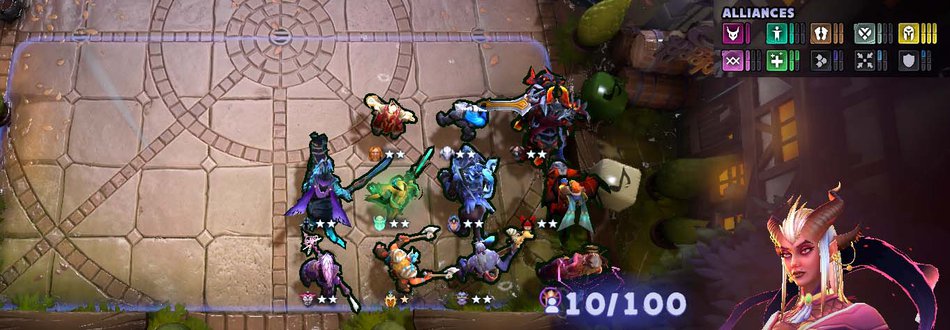
This is the final lineup you are usually aiming for. How you get there depends, but usually you either go for (4) Knights (4) Trolls or for (6) Knights + (2) Healers/Warlocks/Trolls.
They work best with the healing Underlords because they are tanky and rarely get sniped one by one.
Hunters are quite straightforward - they are the best single-target backline damage dealers. Some key things to keep in mind to make Hunters work:
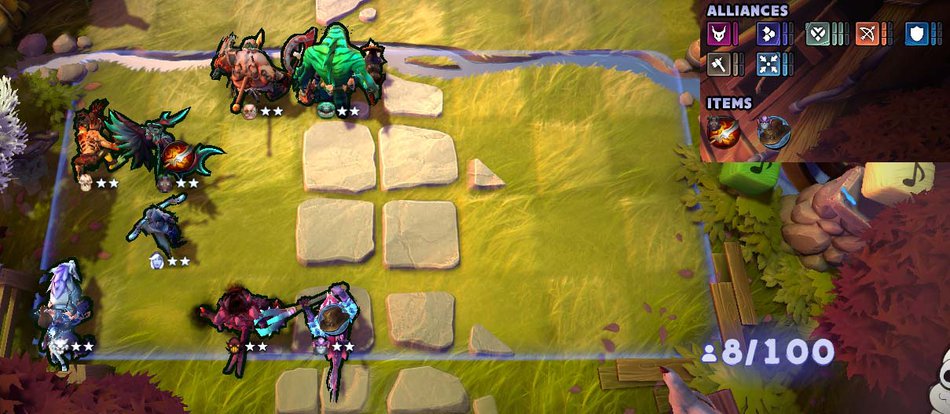
The example above is the most common build. Usually, after lvl8, you want to go for more Vigilant heroes, possibly going for the full (4) Vigilant bonus on lvl10. Arguably, however, it's a better idea to spend some time on lvl8 and 9 rolling in an attempt to find a three-star Terrorblade, as he's your main carry.
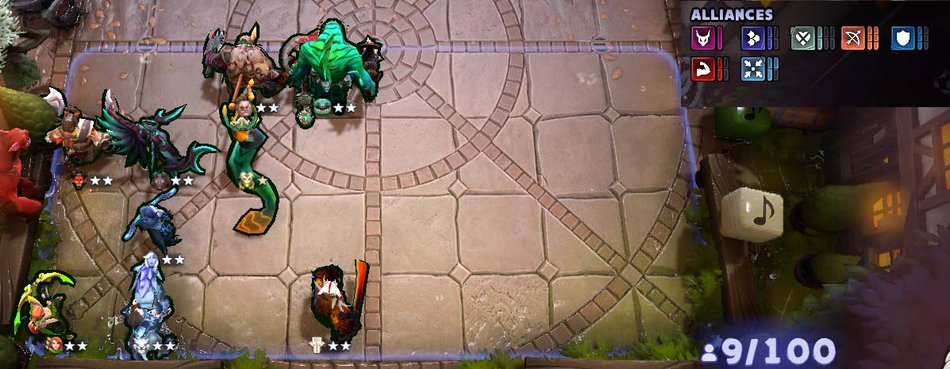
As mentioned, the (3) Hunters + (4) Heartless builds are more popular in the current meta. That said if you want to go for the full (6) Hunters bonus (great in Knockout) this lineup is a great example. You usually want to run Tide + Slardar until you find Medusa. When you do, you can replace Slardar if he's only two stars. If he's close to three - keep him.
The Brawny bonus matters only if your Beastmaster has a good kill count.
Keys to success with Warriors:
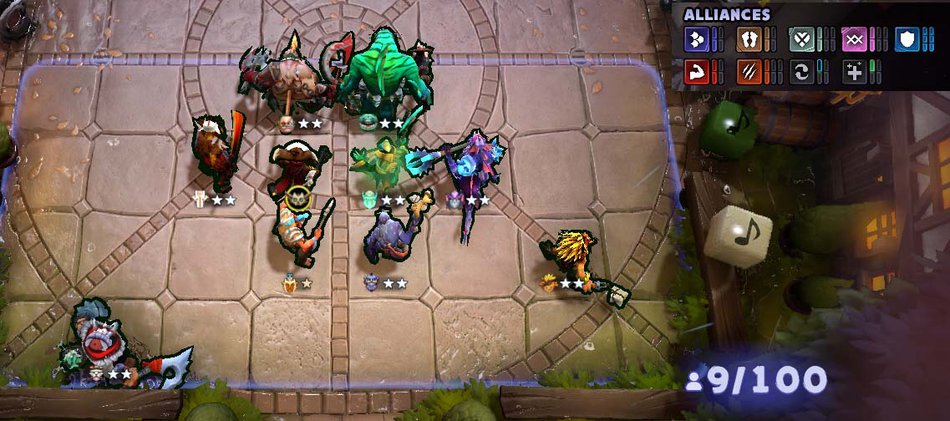
As mentioned, the best Warrior builds right now are the (3) Warrior variations (usually with Hunters and Heartless shown above). That said, if you want to go for the full (6) Warriors, this is a great lineup to aim for. It's a good counter to the prevalent Heartless strategies.
Check our more Warrior Builds in our Dota Underlords Warriors guide.
Some important things to keep in mind:
You can check out more Mage builds in our Dota Underlords Mage Guide.
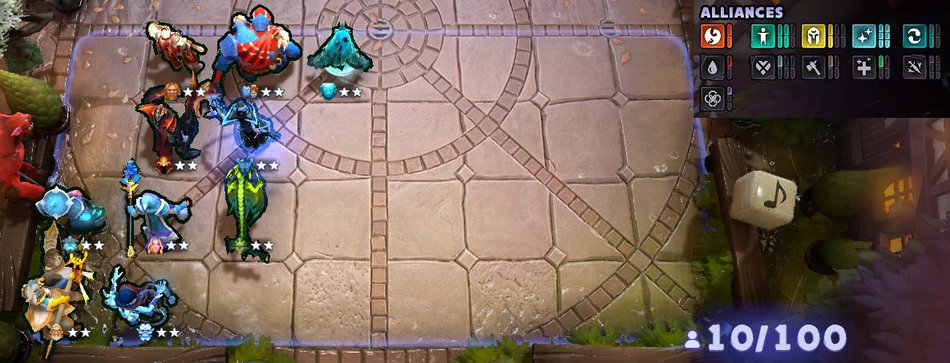
The example above is a good approximation what you're aiming for in the very late game. That said, Mages currently struggle to get there because of a relatively weak mid-game and easy access to Scaled. If you can't reach lvl10, you can lose the Ogre once you find Lich.
Run Snapfire until you find DK (you can also keep all three Dragons and lose Ogre).
If you have a high level Viper, put him on the frontline with a tankiness item (he has a great passive with the Dragons Alliance).
Some keys for success with Savage builds:
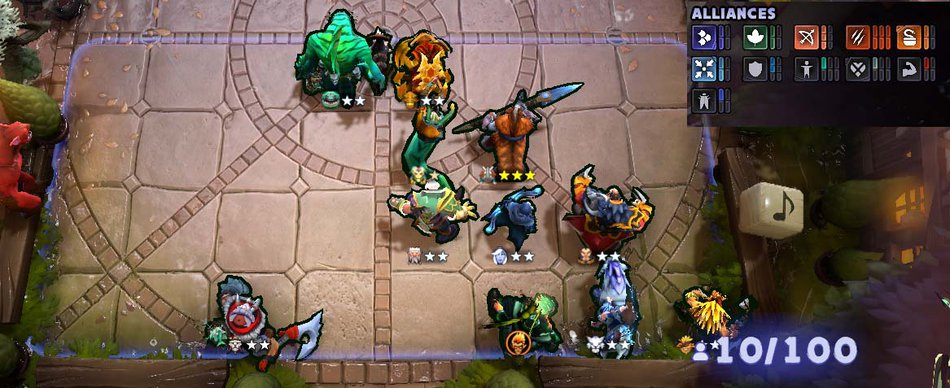
The build above is the theoretically strongest (6) Savage variation. Yet, it's quite hard to get to (it requires you to have a good game and to reach lvl9 and ideally 10 relatively fast).
The alternative is to go for the more common and easier to get (4) Savage (4) Summoner option like the one below:
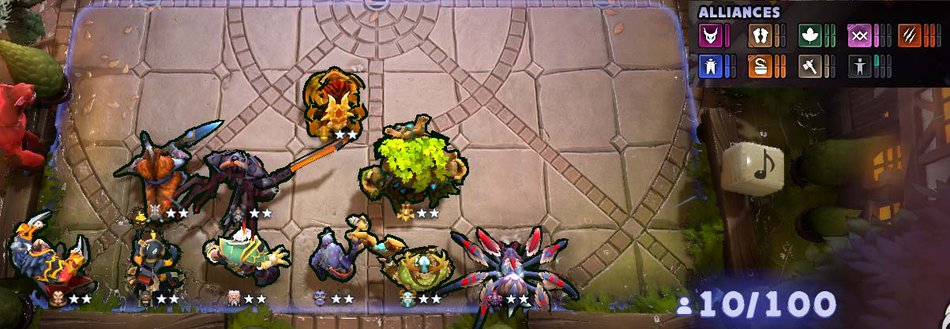
(6) Assassins are in a good spot since the Void Alliance + Faceless Void work great with them.
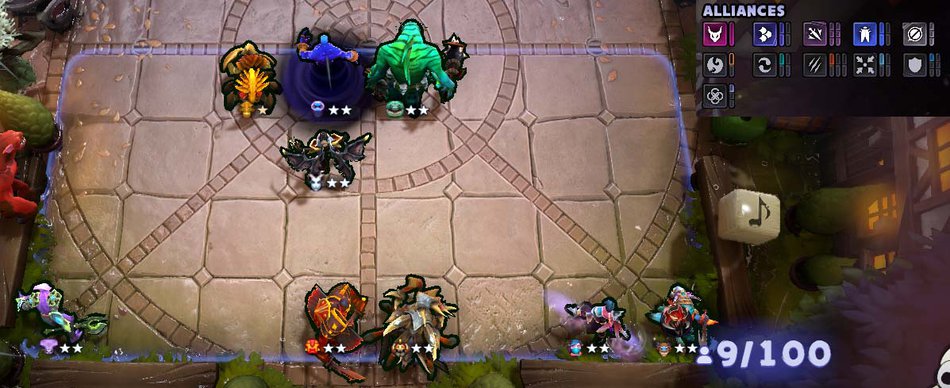
The above is a good example of the final composition you are usually aiming for.
Warlocks are usually used as a secondary synergy for other durable drafts - e.g. Warriors + (4) Warlocks. That said, (6) Warlock build are also quite strong in the late game. Some keys to success:
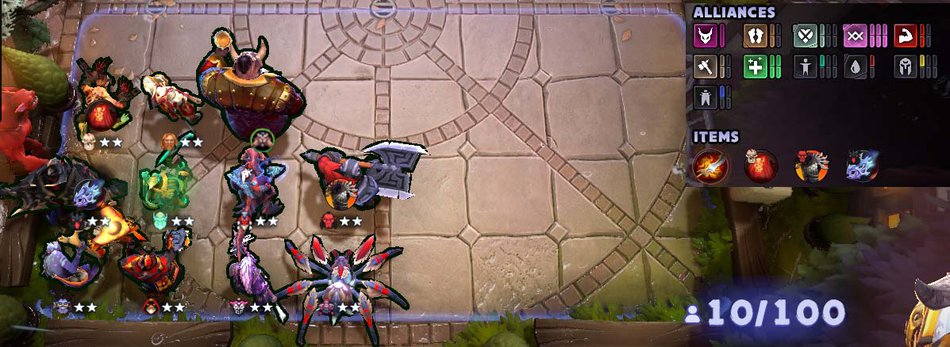
This is one of the best (6) Warlock lineups to be aiming at. In reality, you need to consider what the shop gives you. Make sure you have a decent frontline + (ideally) Healing Jull to benefit from your (4) Warlocks + (2/4) Healers in the mid game.
You can find more Warlock builds in our Dota Underlords Warlocks Guide.
Keys to success:
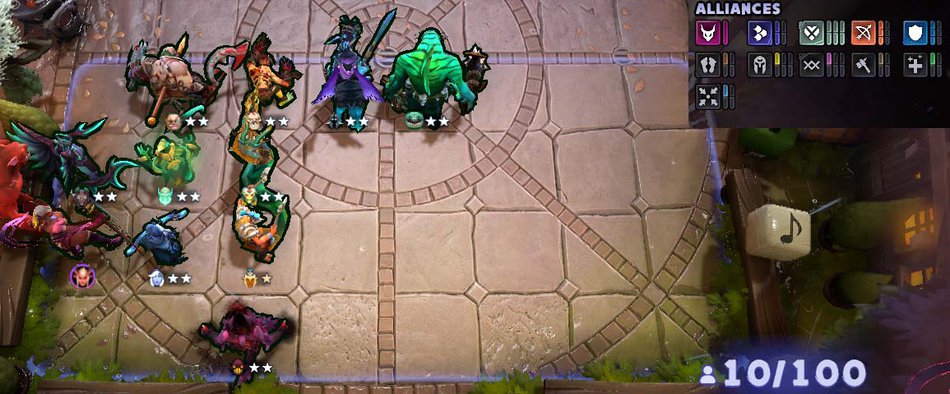
The example above is arguably the best build in the game, and the best thing about it is that you can easily cut two of the Heartless heroes (Necro and Abaddon) and you'll still have a very powerful build on lvl8/9 with (4) Heartless.
Run Slardar until you find Medusa. You might not want to replace him with Troll if you have Slardar on three stars, but a Troll is better than a two-star Slardar if you have the (2) Scaled bonus covered by Medusa.
Utility heroes give much less value when upgraded to a higher star level than tanks and damage-dealers. For example, a one-star Disruptor is usually more than enough to make a Warlock/Brawny builds strong. You use him for the Alliances and the utility of the AoE silence. His stats and the damage of the silence don’t matter that much, so a two/three-star upgrade on Disruptor doesn’t make a huge difference. For contrast - a two-star Troll Warlord is much more impactful than a one-star Troll Warlord and can make a big difference because he contributes with DPS, which depends on his stats.
Understanding which units are your upgrade priorities can help you prioritize bench space easier and improve your results as a whole. The rule of thumbs is that you need upgrades on the heroes that need high stats (tanks and damage-dealers), while you don’t on heroes who you keep mainly for the Alliance and Ace bonuses.
This sounds like an obvious statement. However, I don’t mean just spreading your heroes to avoid AoE, etc. Absolutely minor changes on the board can turn the outcome of the round when the two armies are close in power.
For example, in previous tests we had two corner box formations fighting. Something as simple as swapping the position of Dazzle and Witch Doctor within the formation (both utility heroes, not the main carries or tanks in the draft) changed the outcome of the fight. The reason, in this case, was that Dazzle was a more valuable unit in that particular fight because the round was long (the fight was against a Knight benchmark build) and putting him on the backline meant he can cast more heals over the duration of the fight, bringing a lot of value. Multiple Witchdoctor Casks, in comparison, weren’t as impactful.
In other fights, however, the opposite might be true. For example, against Assassins, a couple of stuns would certainly be more valuable than a couple of heals because Assassins nuke heroes quickly anyway and reduce healing done.
So, if you’re fighting against Assassins the Witch Doctor should be the hero you’re protecting more rather than the Dazzle, while against Knights the opposite is true. Such minor positioning insights could make a big difference in the long run, especially in the last few rounds when you're fighting for the top position.
A very small difference in power could lead to a big difference in the damage inflicted at the end of the round. What we mean is that a strategy would be losing by ~15 damage against a benchmark build in our tests, and then improving it the slightest (e.g. one more hero upgrade) would cause it to win by ~15 damage instead.
The main culprits for this effect are usually AoE damage and heals. Some strategies win or lose gradually, but AoE damage and healing strategies usually have drastic damage swings.
This is easy to imagine with Mages – if your board is slightly weaker than the enemy board, a lot of enemy heroes will survive on a sliver of HP and will inflict a lot of damage to you at the end of the round. Hunters are the opposite – you bring down enemy heroes one by one, so it’s entirely possible that the last standing enemy hero is the one that beats you, inflicting minor damage at the end of the round.
Another great example is Warlocks. They utilize a lot of healing. This means that if they win a round, a lot of the heroes in the Warlock build will survive and will deal a lot of damage to the enemy player at the end of the round. It’s very unlikely that a Warlock build wins the round with just one or two heroes left.
Thanks
for reading! If you enjoyed the article, stay tuned for more Underlords content
(you can give us a follow on our social media below!).
You can see the rest of our Dota Underlords guides in our Library and our articles about the game in our blog. If you are a Dota 2 player as well (which is fairly likely if you're playing Dota Underlords), I bet you'll enjoy our just-for-fun Dota 2 Tier List.
A big thank you to everyone in the Dota Underlords community for the help with the tier list!